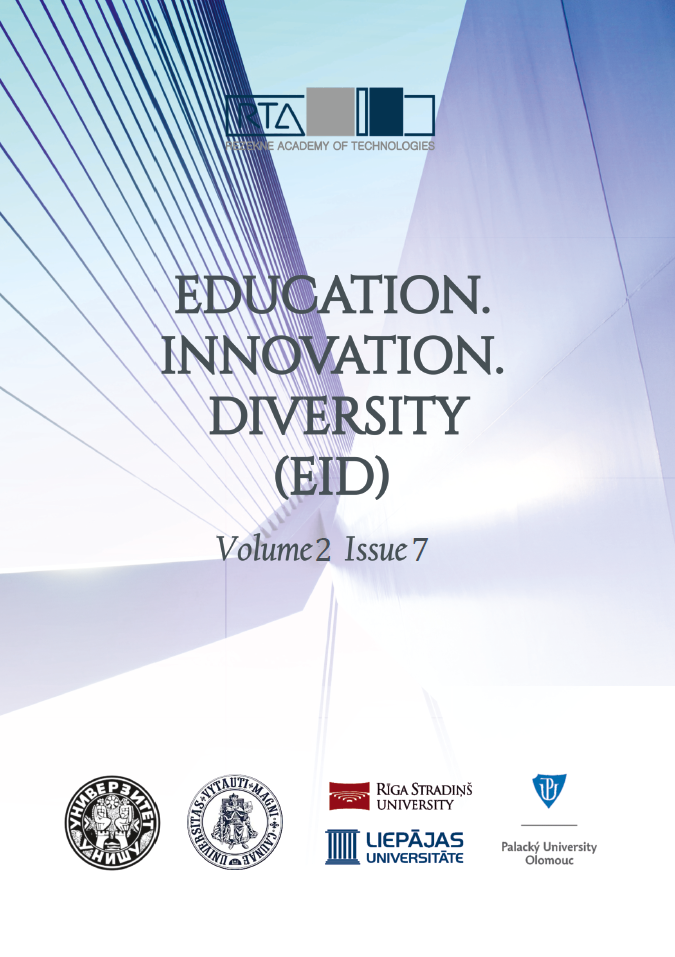THE IMPACT OF RECESS BREAKS IN THE LEARNING PROCESS ON PRIMARY SCHOOL STUDENTS’ CONCENTRATION SKILLS
DOI:
https://doi.org/10.17770/eid2023.2.7360Keywords:
ability to concentrate, breaks, breaks for recess, individual recess strategy, learning process, a studentAbstract
Nowadays one of the major problems in education is the lack of a specific strategy for the implementation of breaks (recess policy) in an educational institution. The development of such a strategy in the majority of cases is different for every school, as evaluating several factors is required, e.g., the age of students, interests, learning needs and progress, the location and specialization of the school, etc. However, students` awareness of the necessity for individual recess strategy gains importance as well. The research aim is to investigate and clarify the possibilities and necessity of recess breaks in primary school. There are theoretical research methods and empirical research methods (students’, teachers’ and parents’ surveys), data processing and analysis methods (quantitative, graphical representation of data, data analysis using IBM SPSS v.22 predictive analytics and statistical analysis software package) used in the research. The analysis of students’ survey emphasized that students more often prefer listening to music or socializing during breaks. While parents’ questionnaire highlighted the necessity for their offsprings to spend more time outside in fresh air. They mean it would help their children to better concentrate in lessons. While teachers` survey analysis revealed that students concentration is better if students are more interested in a particular subject.
References
American Association of Pediatrics (AAP) (2013). The Crucial Role of Recess in school. Pediatrics, 131(1), 183-188. Retrieved from https://pediatrics.aappublications.org/content/pediatrics/131/1/183.full.pdf 03.04.2019
Amutio, A. (2006). Relajación y meditación: Un manual práctico para afrontar el estrés. Barcelona: Biblioteca Nueva.
Atsunori, A. & Lleras, A. (2011). Brief and rare mental 'breaks' keep you focused: Deactivation and reactivation of task goals preempt vigilance decrements. Cognition, 118(3), 439-443. DOI: https://doi.org/10.1016/j.cognition.2010.12.007
Barros, R., Silver, E.J., & Stein, R.E. (2009). School Recess and Group Classroom Behavior. Pediatrics, 123(2), 431-436. DOI: https://doi.org/10.1542/peds.2007-2825
Beļickis, I. (2001). Izglītības alternatīvās teorijas. Rīga: RaKa.
Grobiņš, A. (1988. gada 1. septembris). Drošu sākumu, radošu turpinājumu. Ļeņina ceļš (Liepājas raj.), Nr.105., 2.lpp
Immordino-Yang, M.H., Christodoulou, J.A., & Singh, V. (2012). Rest Is Not Idleness: Implications of the Brain’s Default Mode for Human Development and Education. Perspectives on Psychological Science, Volume 7, Issue 4. DOI: https://doi.org/10.1177/1745691612447308
Jerrell, J.M., McIntyre, R.S., & Park, Y.M.M. (2015). Risk factors for incident major depressive disorder in children and adolescents with attention-deficit/hyperactivity disorder. European child & adolescent psychiatry, 24, 65-73. DOI: https://doi.org/10.1007/s00787-014-0541-z
Kroeker, K. (2022). Recess Is Not All Fun and Games. BU Journal of Graduate Studies in Education, 14(1), 31-34. Retrieved from https://eric.ed.gov/?id=EJ1350817
Kohl, H.W. & Cook, H.D. (2013). Educating the Student Body: Taking Physical Activity and Physical Education to School. Washington (DC): National Academies Press (US).
Ķestere, I. (2005). Pedagoģijas vēsture: skola, skolotājs, skolēns. Rīga: Zvaigzne ABC.
Miķelsons, R. (1941. gada 1. Marts). Apzinīgās disciplīnas audzināšana. Padomju Latvjas Skola, Nr.1.
Murray, R., Ramstetter, C., Devore, C., Allison, M., Ancona, R., ... & Young, T. (2013). The crucial role of recess in school. Pediatrics, 131(1), 183-188. DOI: https://doi.org/10.1542/peds.2012-2993
Müller, C., Otto, B., Sawitzki, V., Kan Agalingam, P., Scherer, J., & Lindberg, S. (2021). Short breaks at school: effects of a physical activity and a mindfulness intervention on children's attention, reading comprehension, and self-esteem. Trends in Neuroscience and Education, 25. DOI: https://doi.org/10.1016/j.tine.2021.100160
Ozols, J. (1944. gada 01. 03). Uzmanība, tās nozīme un audzināšana skolas darbā. Izglītības Mēnešraksts, Nr.3.
Parrish, A.M., Okely, A.D., Stanley, R.M., & Ridgers, N.D. (2013). The Effect of School Recess Interventions on Physical Activity: a Systematic Review. Sports Med., 43, 287-99. DOI: https://doi.org/10.1007/s40279-013-0024-2
Patrick, H., Kaplan, A., & Ryan, A.M. (2011). Positive classroom motivational environments: Convergence between mastery goal structure and classroom social climate. Journal of Educational Psychology, 103(2), 367- 382. DOI: https://psycnet.apa.org/doi/10.1037/a0023311
Pellegrini, A.D., & Bjorklund, D.F. (1997). The role of recess in children's cognitive performance. Educational Psychologist, 32(1), 35–40. DOI: https://doi.org/10.1207/s15326985ep3201_3
Pellegrini, A.D. & Smith, P.K. (1993). School recess: Implications for education and development. Review of Educational Research, 63(1), 51-67. DOI: https://doi.org/10.3102/00346543063001051
Ramstetter, C.L., Murray, R., & Garner, A.S. (2010). The Crucial Role of Recess in Schools. Journal of School Health, 80(11), 517-526. DOI: https://doi.org/10.1111/j.1746-1561.2010.00537
Rock, D. (2012). Your Brain on Facebook. Harvard Business Review. Pieejams: https://hbr.org/2012/05/your-brain-on-facebook
Sampaio, D. & Almeida, P. (2018). Students’ motivation, concentration and learning skills using Augmented Reality. In 4th International conference on higher education advances (HEAD'18) (pp. 1559-1566). Editorial Universitat Politècnica de València. DOI: https://doi.org/10.4995/HEAD18.2018.8249
Skola2030. (bez g.). Ieteikumi mācību satura integrētai plānošanai sākumskolā: Metodiskais līdzeklis sākumskolas skolotājam. Retrieved from https://mape.skola2030.lv/resources/9474
Zenner, C., Herrnleben-Kurz, S., & Walach, H. (2014). Mindfulness-based interventions in schools—a systematic review and meta-analysis. Frontiers in psychology, 5, 603. DOI: https://doi.org/10.3389/fpsyg.2014.00603
Zoogman, S., Goldberg, S.B., Hoyt, W.T., & Miller, L. (2015). Mindfulness interventions with youth: A meta-analysis. Mindfulness, 6, 290-302. DOI: https://doi.org/10.1007/s12671-013-0260-4
Wood, C. & Freeman-Loftis, B. (2015). Playground: Make recess a time of joy and learning. In Responsive school discipline: Essentials for elementary school leaders. Center for Responsive Schools. https://www.responsiveclassroom.org/sites/default/files/RSDch12.pdf
Downloads
Published
Issue
Section
License
Copyright (c) 2023 Education. Innovation. Diversity.

This work is licensed under a Creative Commons Attribution 4.0 International License.






